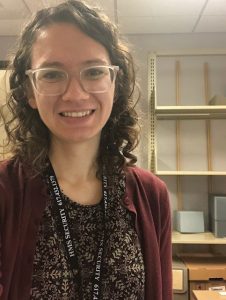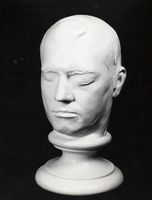 My name is Stephanie Krauss and I have learned so much since starting my job as a Reference Archivist in January 2019. As the reference archivist, I staff the reading room, work with researchers, and assist with exhibitions and events. Since I have started, I have learned a lot about the history of medicine’s intersections with society, specifically with feminism and race. The Center receives a myriad of questions regarding the history of family planning, as we have the papers of John Rock, Abraham Stone, and other physicians involved in the creation of birth control. Each question that comes in gives me an opportunity to learn something new about this important topic!
My name is Stephanie Krauss and I have learned so much since starting my job as a Reference Archivist in January 2019. As the reference archivist, I staff the reading room, work with researchers, and assist with exhibitions and events. Since I have started, I have learned a lot about the history of medicine’s intersections with society, specifically with feminism and race. The Center receives a myriad of questions regarding the history of family planning, as we have the papers of John Rock, Abraham Stone, and other physicians involved in the creation of birth control. Each question that comes in gives me an opportunity to learn something new about this important topic!
Additionally, I have really enjoyed working with our rare book collection. Having the opportunity to explore early medical text such as Vesalius and Avicena is such a unique experience. One highlight was when the Center hosted its annual Anatomy Day, gives which the whole Longwood community a chance to explore these early medical texts. I loved having the opportunity to talk to my colleagues and peers about these influential texts and drawings. I am already looking forward to next year’s event.
In my free time, I enjoy running and hiking. I am currently trying to hike all the 4,000 foot mountains in New Hampshire and visit all the United States national parks. I recently started trail running, and I am enjoying exploring trails in the Boston area.
I look forward to continuing to work with the faculty, staff, and students here at the Center for the History of Medicine.
 We’re delighted to announce that Charlotte Lellman has joined the Center for the History of Medicine staff as our new Processing Archivist. In this role Charlotte will arrange and describe manuscript collections and archival records at the Center to ensure their accessibility, preservation, discovery, and use. She will also assist in the ongoing development and refinement of local processing and description practices, and contribute to the Center’s culture of evaluation by maintaining processing metrics and project documentation.
We’re delighted to announce that Charlotte Lellman has joined the Center for the History of Medicine staff as our new Processing Archivist. In this role Charlotte will arrange and describe manuscript collections and archival records at the Center to ensure their accessibility, preservation, discovery, and use. She will also assist in the ongoing development and refinement of local processing and description practices, and contribute to the Center’s culture of evaluation by maintaining processing metrics and project documentation.
Charlotte’s previous work includes processing collections at The Mary Baker Eddy Library, providing reference services at the gallery of the Boston Public Library’s Leventhal Map Center, and serving as a research assistant on an eighteenth century French police archives database project at Haverford College. Charlotte also has previous experience at the Center: in 2018, she processed the Elinor Kamath papers as a Simmons College intern, and in 2017 she worked on a wet specimen data entry project for the Warren Anatomical Museum.
Charlotte holds an M.S. in Library and Information Science with a concentration in Archives Management from Simmons College, and a B.A. in French Language and Literature from Haverford College.
Her first project is to process the Irene E. Kochevar papers, 1976-2012 (inclusive), which is currently underway. Please join us in offering Charlotte a warm welcome!
The Center for the History of Medicine is pleased to announce that the recording of the April 4, 2019 symposium, Human Tissue Ethics in Anatomy, Past and Present: From Bodies to Tissues to Data, is now online. The symposium, which was co-sponsored by Harvard University’s Ackerman Program on Medicine and Culture, the Center for the History of Medicine in the Francis A. Countway Library, Harvard Medical School’s Department of Global Health and Social Medicine, and the Department of Pediatrics, Boston Children’s Hospital, explored transparent and ethical anatomical body and tissue procurement as a cornerstone of medical ethics in research and education. Watch the Tissue Ethics symposium.
Symposium Contents
Panel 1: Human Tissue Ethics in Historical Contexts of Anatomy
Scott H. Podolsky, Harvard Medical School, Chair
- Dominic W. Hall, Harvard Medical School: The Second Life of Specimens: Scientific and Historical Research in the Warren Anatomical Museum
- Sabine Hildebrandt, Harvard Medical School/Boston Children’s Hospital: Dealing with Legacies of Nazi Anatomy: the ‘Vienna Protocol’
- Tinne Claes, Katholieke Universiteit: Why Is It So Difficult to Throw Away Fetuses? Anatomical Collections and the Meanings of Disposal

Speaker Sabine Hildebrandt giving her talk, Dealing with Legacies of Nazi Anatomy: the ‘Vienna Protocol’
Panel 2: Human Tissue Ethics in Current Anatomical Education and Research
Dan Wikler, Harvard T.H. Chan School of Public Health, Chair
- Thomas Champney, University of Miami: The Business of Bodies: Human Tissue Ethics and Commercialization
- Michel Anteby, Boston University: Nested Moralities: From National to Intimate Cadaver Trades

Thomas Champney giving his talk, The Business of Bodies: Human Tissue Ethics and Commercialization
Panel 3: Human Tissue Ethics from Physical Specimens to Data
David S. Jones, Harvard University, Chair
- Maria Olejaz Tellerup, University of Copenhagen: The Anatomy of Bioavailability: Exploring Body Donation in Denmark Then, Now and in the Future
- Jon Cornwall, University of Otago: The Impact of Digital Technology on Body Donation

Maria Olejaz Tellerup giving her talk, The Anatomy of Bioavailability: Exploring Body Donation in Denmark Then, Now and in the Future
The Center for the History of Medicine is pleased to announce that it has received S.T. Lee Innovation Grant funding for its 2018 proposal, “Beyond the Beyond Box.” The application was one of nineteen proposals to bring together Harvard faculty members and library staff; of the nineteen, only six projects were funded. Dominic Hall, Curator, Warren Anatomical Museum, will be spearheading the initiative in partnership with Professor Anne Harrington, Franklin L. Ford Professor of the History of Science.

Plaster head cast made of Phineas Gage by Henry Jacob Bigelow at Harvard Medical School in 1850 to substantiate the specifics of Gage’s neurotrauma
“Beyond the Bone Box” was inspired by Harvard Medical School’s retired bone box program, which enabled medical students to borrow sets of human bones for home study, and developed in partnership with Harvard faculty, curators, archivists, and librarians, this project will develop three circulating resources that contain 3D-printed copies of Warren Anatomical Museum specimens highly contextualized by surrogates of special collections materials. Through this project, the Center seeks to democratize access to unique and sensitive collections through quality fungible surrogates and engender new forms of engagement with Harvard’s special collections across its library system.
The first circulating resource will be a teaching kit built around the case of Phineas Gage, the 19th century railroad foreman whose prefrontal cortex injury has been used to academically and popularly illustrate post-traumatic social disinhibition for the last 150 years.
Project work will begin in September. For the complete list of Lee Innovation Grant award recipients, click here.
 My name is Stephanie Krauss and I have learned so much since starting my job as a Reference Archivist in January 2019. As the reference archivist, I staff the reading room, work with researchers, and assist with exhibitions and events. Since I have started, I have learned a lot about the history of medicine’s intersections with society, specifically with feminism and race. The Center receives a myriad of questions regarding the history of family planning, as we have the papers of John Rock, Abraham Stone, and other physicians involved in the creation of birth control. Each question that comes in gives me an opportunity to learn something new about this important topic!
My name is Stephanie Krauss and I have learned so much since starting my job as a Reference Archivist in January 2019. As the reference archivist, I staff the reading room, work with researchers, and assist with exhibitions and events. Since I have started, I have learned a lot about the history of medicine’s intersections with society, specifically with feminism and race. The Center receives a myriad of questions regarding the history of family planning, as we have the papers of John Rock, Abraham Stone, and other physicians involved in the creation of birth control. Each question that comes in gives me an opportunity to learn something new about this important topic! We’re delighted to announce that Charlotte Lellman has joined the Center for the History of Medicine staff as our new Processing Archivist. In this role Charlotte will arrange and describe manuscript collections and archival records at the Center to ensure their accessibility, preservation, discovery, and use. She will also assist in the ongoing development and refinement of local processing and description practices, and contribute to the Center’s culture of evaluation by maintaining processing metrics and project documentation.
We’re delighted to announce that Charlotte Lellman has joined the Center for the History of Medicine staff as our new Processing Archivist. In this role Charlotte will arrange and describe manuscript collections and archival records at the Center to ensure their accessibility, preservation, discovery, and use. She will also assist in the ongoing development and refinement of local processing and description practices, and contribute to the Center’s culture of evaluation by maintaining processing metrics and project documentation.


